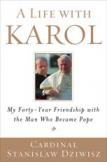Always at His Side
This book is not what I expected. I had anticipated a memoir, but A Life With Karol is less that and more what its title page describes as “a conversation.” Thus, while the book generally advances chronologically, it moves forward and backward in time as the conversation develops. As a conversation it is sometimes jarringly colloquial, with phrases like “give it a shot” or “scope the place out” that take some getting used to. Cardinal Stanislaw Dziwisz separates his work into the observations of what he calls the witness and the narrator. The “witness” reflects his personal views and is hardly unbiased; the “narrator” provides the objective context. Frequently, though, the opinions of the narrator seem as subjective as those of the witness.
Furthermore, as a historian, I had expected the bookto be a series of personal anecdotes about Pope John Paul II recounted by someone who was probably closer to him than anyone else, both officially and personally, over a 40-year span. It is not. Rather it is a reflective, philosophical, affectionate if somewhat impersonal assessment of the man who for almost 28 years served as pope and who, Dziwisz believes, became the “prophet of a new era in the church.”
Dziwisz, now the cardinal archbishop of Krakow, first met Karol Wojtyla as his seminary instructor, was later ordained by him and three years later was invited to become then-Archbishop Wojtyla’s secretary. After Wojtyla’s election as pope, Dziwisz was asked to continue in that position. It is from those perspectives that he observes and interprets the Polish and papal years of Karol Wojtyla, Pope John Paul II. As such he looks at John Paul the man, the statesman and the pope. In each of these roles, he does not add much to what has already been written by others, most notably George Weigel in his comprehensive biography, Witness to Hope. Dziwisz is, however, a firsthand witness to the simplicity of John Paul, his daily routine, his secret trips to the ski slopes early in his papacy, his intense prayerfulness. The author also provides a highly personal account of the assassination attempt as well as a moving recollection of John Paul’s final hours.
In assessing John Paul’s international role, Dziwisz reiterates the somewhat standard interpretations by Vatican observers, which are not shared by all historians. He believes that without John Paul, the Solidarity movement in Poland would not have survived and the subsequent history of Eastern Europe might well have taken a different course. He dismisses the “Bulgarian connection” to the assassination and believes, as he says John Paul did, that the Soviet leadership was its instigator. He credits John Paul with shifting Vatican Ostpolitik from narrow negotiations to obtain church freedoms to a broader commitment to human rights. As an international statesman, John Paul was not hesitant to speak to power, whether criticizing capitalism for failing to acknowledge the “centrality of man” in the economic and political process, privately telling General Pinochet in Chile to return power to the civil authorities, or rejecting pre-emptive war as “a unilateral and therefore illegal and immoral undertaking.”
But the heart of this book is Dziwisz’s insights into John Paul the pope and his vision for the church in the 21st century. Dziwisz is concerned that the popular view of John Paul dwells too much on his secular role and does not appreciate enough his religious leadership. Dziwisz argues that John Paul was a progressive with a countercultural attitude, unafraid of change and one who sought to combine the church’s salvific mission with service to all people. Thus with his emphasis on ecumenism, liturgical renewal and the role of the laity, he was a true son of the Second Vatican Council and worked to carry out its purpose.
Dziwisz also stresses John Paul’s travels as integral to his ministry and his style of governance, giving visible witness to Catholicism’s universality and its solidarity with all peoples. He agrees with John Paul that materialism is the real adversary to the Gospel message and the need for the church to be a “voice for the voiceless” based on the authentic teachings of the church and the Gospel—not on a theology “contaminated by radical schools of thought.”
In another part of the conversation, Dziwisz correctly highlights John Paul’s ability to relate to youth and his lifelong affection for Jewish friends. But he perhaps overstates the pope’s sensitivity for Judaism and his views on the role of women in the church, both of which seem to present sometimes mixed messages. Toward the end of the book, Dziwisz connects John Paul and Mother Teresa, viewing them both as contemplative mystics, witnessing in their own ways to a new humanism: the value of the human person, the protection of human rights and the defense of life and the family. Cardinal Dziwisz concludes that John Paul was always looking ahead, always confident that “the world can change.” In this filial tribute to his spiritual father, Dziwisz believes John Paul was “a charismatic prophet and missionary” who became the human “face of God” and laid the groundwork for a new spirituality and a new way of living the faith in the modern world.
History will see if he is correct.
This article also appeared in print, under the headline “Always at His Side,” in the May 19, 2008, issue.








